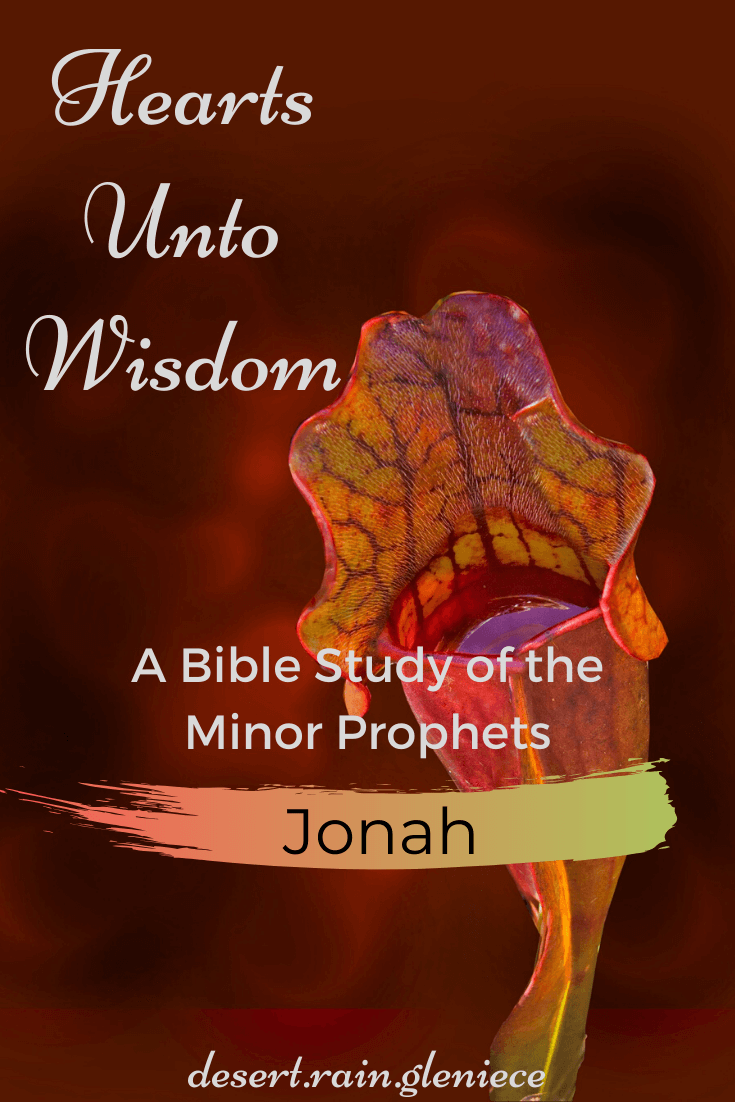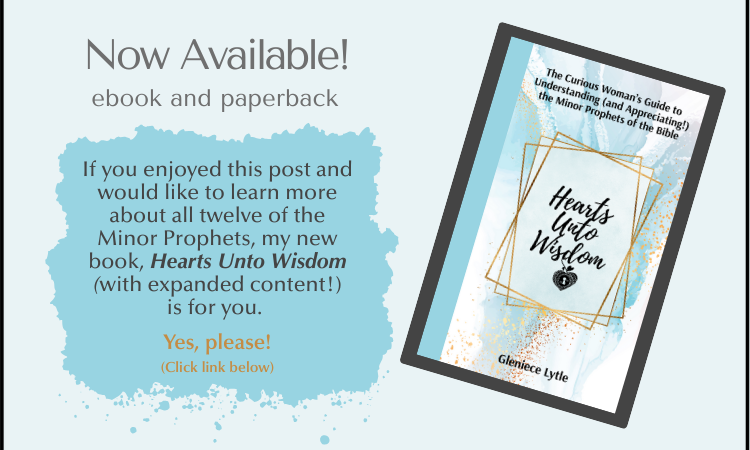Christian storybooks regale us with the colorful tale of Jonah and the Big Fish. Even secular children’s book publishers find it vastly entertaining (and lucrative).
But if we look deeper into this familiar book of the Bible, we will discover a magnificent parallel of God’s love and redemption to a multitude of sorrowful people as well as lessons taught to a man who sorrowed for all the wrong reasons.
Welcome to Hearts Unto Wisdom
A Bible Study of the Minor Prophets
I thank you for joining me as I share biblical insight into the twelve books commonly referred to as the “Minor Prophets.” These Old Testament books, starting with Hosea and ending with Malachi, are minor only in regard to their length, and not because they lack significance.
So teach us to number our days, that we may apply our hearts unto wisdom. (Psalm 90:12)
[Words in bold or italics added for emphasis to Bible verses throughout this study.]
Jonah
Have you ever thought of running away from God?
I know your first response would be “certainly not!” But if you stop and think before reacting, there are probably many times when you ran away from full obedience to God and all that He’d asked you to do. Squeezing our eyes shut and turning our backs is a common response to painful or difficult biblical commands. I know, I’ve done it myself.
And here in the first chapter of Jonah, Jonah does it too.
The grandeur of Nineveh
Nineveh was a spectacular city in its day. Second only to Babylon in size and splendor.
The entire circuit of this massive walled city measured seven and a half miles. In 1845, archaeologists dug up remains of paved streets and exquisite gates flanked by giant winged bulls and lion sphinxes.
They unearthed a grand palace flanked by seventy-one halls 40 feet wide and 180 feet long, paneled with slabs of sculptured alabaster recording the great deeds of the Assyrian kings.
These archaeologists also discovered extensive libraries filled with thousands upon thousands of clay tablets; the largest known collection of ancient books on every subject imaginable.
Nineveh, the capital of Assyria, was a formidable and awe-inspiring place. It was also Israel’s prime enemy of the day.
Yet God commanded Jonah to go there anyway and declare their need to repent before their impending destruction.
Was Jonah scared, intimidated, hardhearted, complacent, or just plain angry to be sent to warn Israel’s enemy? We don’t know—maybe all of the above. We do know Jonah didn’t say yes to God but tried to hide from Him instead.
Whither shall I go from thy spirit? or whither shall I flee from thy presence? If I ascend up into heaven, thou art there: if I make my bed in hell, behold, thou art there. (Psalm 139:7–8)
Can any hide himself in secret places that I shall not see him? saith the Lord. Do not I fill heaven and earth? saith the Lord. (Jeremiah 23:24)
We can never hide from God
In our distress, we may not physically run away from God as Jonah attempted, but we do run mentally. We ignore the prompting of His Spirit and run away from His Word—as if that will ease our minds.
Nothing good ever comes from ignoring God. We only find more trouble and heartache.
For innumerable evils have compassed me about: mine iniquities have taken hold upon me, so that I am not able to look up; they are more than the hairs of mine head: therefore my heart faileth me. (Psalm 40:12)
Jonah’s unfaithfulness caused not only his own trouble, but he put at risk the innocent men on the ship that he hired to take him to Tarshish. When we sin, it not only affects us but every other life we touch.
However, a testimony of the power of God was about to be revealed to those men. When they learned that it was Israel’s God that Jonah was fleeing, they were exceedingly afraid. This wasn’t just any god, this was THE God.
The ship heaved violently, the winds howled, the lashing salt spray doused the frightened men; the ship was doomed and Jonah knew it was his fault. Yet he cared enough for these strangers, these fellow shipmates, that he agreed to be cast into the sea and die for their sake. And the men knew enough about right and wrong to be fearful of killing an innocent man and pleaded with God to not lay it to their charge.
(Funny how fickle we are. One day we’re running away, not caring about anyone but ourselves, another day we’re willing to give ourselves up for the good of others. What a comfort to know our God never vacillates between doing what’s right for us.)
With Jonah overboard and the raging sea calmed, these thankful men turned to the living God, sacrificed to Him and made vows. Sometimes our witness, however messy it is, will be the very thing God uses to convert the unbelievers in our lives.
Our darkest moments
Our manifold trials may come about through no fault of our own or sadly, we bring them on ourselves.
In the midst of a great trial, who hasn’t convinced themselves that God has left them on their own? Especially if our trial is directly related to our sinful actions, we picture an austere God who no longer loves us.
We hate ourselves, we’re hurting more than ever before, and don’t see any way out. But our suffering at the hand of God is not because He doesn’t love us (that’s just our emotions casting doubt), but because HE DOES.
For I said in my haste, I am cut off from before thine eyes: nevertheless thou heardest the voice of my supplications when I cried unto thee. (Psalm 31:22)
All is not lost and we are not forgotten. On the contrary, when we seek God, when we cry out to Him for forgiveness, no matter how far we’ve run, He hears us every time.
Save me, O God; for the waters are come in unto my soul. I sink in deep mire, where there is no standing: I am come into deep waters, where the floods overflow me. I am weary of my crying: my throat is dried: mine eyes fail while I wait for my God. (Psalm 69:1–3)
Jonah was in the worst way, buried alive in a fish’s gut. No food, no water, putrid air to breathe, and no light whatsoever. He could have curled up and died feeling as though God had completely abandoned him. But he didn’t. He cried out to God instead.
When my soul fainted within me I remembered the Lord: and my prayer came in unto thee, into thine holy temple. (Jonah 2:7)
In my distress I called upon the Lord, and cried unto my God: he heard my voice out of his temple, and my cry came before him, even into his ears. (Psalm 18:6)
The sacrifice of thanksgiving and paying your vows
Even when things are at their worst, do what Jonah did. Praise God. This is your sacrifice of thanksgiving.
But I will sacrifice unto thee with the voice of thanksgiving; I will pay that that I have vowed. Salvation is of the Lord. (Jonah 2:9)
Sacrifice your belief you deserve better. Sacrifice your bad attitude and finger-pointing. Sacrifice your desire to complain and blame and lash out and doubt; sacrifice all these and trade them for thanksgiving, realizing how precious your salvation is.
Offer unto God thanksgiving; and pay thy vows unto the most High: And call upon me in the day of trouble: I will deliver thee, and thou shalt glorify me. (Psalm 50:14–15)
What does it mean to “pay your vows”? In Bible times, a vow was a free will promise to God. It was a commitment to perform an act of service which He expected you to honor.
If a man vow a vow unto the Lord, or swear an oath to bind his soul with a bond; he shall not break his word, he shall do according to all that proceedeth out of his mouth. (Numbers 30:2)
Along with our marriage vows, our vows as children of God are to continue in faith, trust, and obedience to God and His Word. These we must “pay” these every day.
A hidden gem in the book of Jonah
The most powerful sentence tucked in the book of Jonah is this: “They that observe lying vanities forsake their own mercy” (Jonah 2:8).
What do we “observe” about ourselves, the world, and others that is not true? What falsehoods do we cling to that hamper our walk with God?
To observe lying vanities is the same as protecting our self-interests (read: sins); we justify ourselves and guard our unsatisfactory emptiness as if it were a coveted heirloom.
Do we realize what we’re giving up when we choose our own ruin wrapped in a fancy package labeled “personal rights and freedom”? We forsake the mercy God wants to give us.
We spend too much time defending our self, our perspective, our viewpoint, and we don’t trust God enough to take care of us the way He knows best. We bury ourselves in the heaviness of lying vanities. And in so doing, we keep back the full protection and blessings we desperately want.
We are our own worst enemy.
The world tells you to “find yourself” for true fulfillment. But God says, “He that findeth his life shall lose it: and he that loseth his life for my sake shall find it” (Matthew 10:39).
True fulfillment is in God alone who loves us (even with our fumbling trust) to wrap us in His tender mercy when our repentant hearts cry out.
He that covereth his sins shall not prosper: but whoso confesseth and forsaketh them shall have mercy. (Proverbs 28:13)
Sunk in the bowels of despair and a putrid fish, Jonah realized this truth.
Nineveh repents and so does God
After being vomited up by the great fish, Jonah begins the long walk toward his mission call. (What a sight and smell he must have been to the inhabitants!)
Surprisingly, the king and the people of Nineveh did not hesitate to believe God would do what Jonah said He would do. They chose to listen to God’s prophet.
Men, women, children, even their cattle were covered in sackcloth.
(Sackcloth was a rough, uncomfortable garment made from black goat’s hair worn as a symbol of grief or penitence.)
The king, sitting in sackcloth and ashes, immediately proclaimed a fast and ordered everyone to cry out to God and turn from their evil ways.
(Ashes represent desolation and ruin. Paired together with sackcloth, they were a sign of repentance and humility before God—an outward showing of what the inward man was feeling.)
And God, seeing their sincerity and willingness to change, reversed His intentions to destroy them.
And God saw their works, that they turned from their evil way; and God repented of the evil, that he had said that he would do unto them; and he did it not. (Jonah 3:10)
Yes, God repents. But our repentance is much different than God’s.
We repent by changing our minds from doing wrong and in humility turn about and face God. With a new mindset, we begin to do what is right according to His word.
God in all His righteousness and mercy, changes His mind from dispensing punishment and affliction (what the KJV calls ‘evil’) to us when we repent and turn from our self-centered, self-righteous ways.
The readiness to repent and worship God by the “heathens” of Nineveh corresponds with Christ finding greater faith outside of Israel.
Wherefore neither thought I myself worthy to come unto thee: but say in a word, and my servant shall be healed.
For I also am a man set under authority, having under me soldiers, and I say unto one, Go, and he goeth; and to another, Come, and he cometh; and to my servant, Do this, and he doeth it.When Jesus heard these things, he marvelled at him, and turned him about, and said unto the people that followed him, I say unto you, I have not found so great faith, no, not in Israel. (Luke 7:7–9)
Was saving Nineveh a parallel to what Christ would do for the whole world? Nineveh was the enemy of Israel, but we all were, at one time, the enemies of God (Romans 5:10). Yet, His love is so great toward us, He chose to die in our place.
Nineveh went from hearing to repentance; no running, no scoffing, no justifying themselves. When we do the same, God sees and justifies us through Christ.
Nineveh repents and Jonah gets mad
Jonah shows his disdain for the Ninevites by sulking outside the city walls. (Was he hoping to witness the destruction of the city after all?)
What displeased Jonah most? That the inhabitants repented? That God didn’t destroy them? Was it jealousy that God indeed loves all people and is willing to save them and not just his nation? That God would forgive his nation’s enemy?
Or was it simply that he was angry he had to disrupt his life to obey God in the first place?
What displeases us?
We go through a lot of turmoil, anguish, and pain in our lives and sometimes it leads to anger; anger at a God who allows us to go through fish-gut trials. We despair even of life and wish to be done with it.
But do we have a right to be angry? Are we not vessels to be used by God for our good and the good of others?
For the wrath of man worketh not the righteousness of God. (James 1:20)
But now, O Lord, thou art our father; we are the clay, and thou our potter; and we all are the work of thy hand. (Isaiah 64:8)
While pouting outside Nineveh’s walls, Jonah cared more for the shade-giving plant that God gave him overnight but had withered away than he did for all the people of Nineveh.
God, through this trial of blazing heat, scorching wind, and discomfort, showed Jonah his errors in thinking. He showed him that God indeed cares for all people and is willing to save any who repent and come to Him.
No one is exempt from God’s love, mercy, and redemption.
Even in our sadness, desolation, and yes, even anger, God is right beside us willing to relieve us of our pain like a sultry breeze in the fiercest sun.
It is of the Lord’s mercies that we are not consumed, because his compassions fail not. (Lamentations 3:22)

Jonah, an archetype of Christ
Jonah, the son of Amittai, is mentioned twice in the Bible. Here in the book of Jonah and in 2 Kings 14:25.
The name “Jonah” means dove. In Matthew 10:16, we are told to be wise as serpents and harmless as doves in our Christian lives. God’s Spirit descends upon Jesus Christ in the visible form of a dove after His baptism (Matthew 3:16).
The name “Amittai” means habitually truthful and honest, trustworthy, and faithful.
Christ is Amittai.
He is always faithful and true and Jonah descends upon Nineveh (the world) like the dove of His Spirit offering them the only way to salvation.
God gives us His Spirit when we repent and accept Christ as our Savior. This Spirit is the Spirit of His Son. Wise, gentle, faithful, and true.
But ye are not in the flesh, but in the Spirit, if so be that the Spirit of God dwell in you. Now if any man have not the Spirit of Christ, he is none of his. (Romans 8:9)
Jonah experienced a type of death in the deep of the sea for three days and three nights, and Christ died and was buried in a dark cave, the heart of the earth, for the same length of time.
The Pharisees would not listen to Christ and demanded a sign that He was the Messiah, but He refused to give one except for the sign of the prophet Jonah.
Christ also scorned the self-sufficient Pharisees by praising the men of Nineveh (unworthy gentiles to the Pharisees) who actually listened to God’s Word preached to them and repented.
For as Jonas was three days and three nights in the whale’s belly; so shall the Son of man be three days and three nights in the heart of the earth.
The men of Nineveh shall rise in judgment with this generation, and shall condemn it: because they repented at the preaching of Jonas; and, behold, a greater than Jonas is here. (Matthew 12:40–41)
We learn from the book of Jonah that no one is exempt from God’s divine love and redemption. He is no respecter of persons (Romans 2:11).
For there is no difference between the Jew and the Greek: for the same Lord over all is rich unto all that call upon him. (Romans 10:12)
And like Jonah, we may suffer trial upon trial. But these trials are learning opportunities from a merciful God who wants us to stop running away out of fear and defiance. He wants us to rise up in full assurance of His love and keep walking toward our mission call of faith.
Abiding in the Vine,
~ Gleniece

Hearts Unto Wisdom
If you like this content and would like to stay up to date, please sign up below for my monthly newsletter, Abide & Blossom. I look forward to seeing you on my list. Thank you!
Would you like to share this post?

